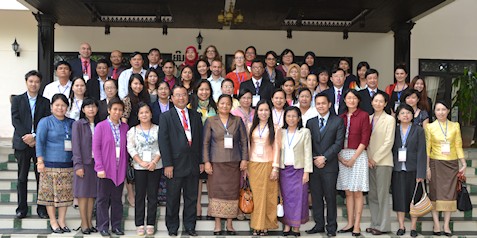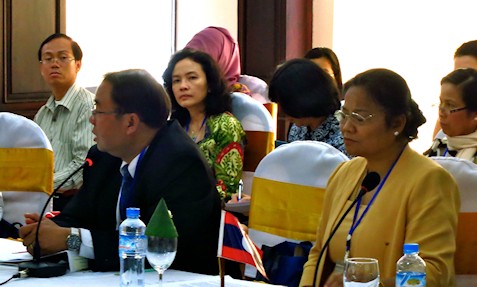ASEAN forges new partnerships with women and girls to meet HIV goals
Date:
 Delegates at the Consultative Meeting on HIV and Key Affected Women and Girls, Phousi Hotel, Luang Prabang
Delegates at the Consultative Meeting on HIV and Key Affected Women and Girls, Phousi Hotel, Luang Prabang
Photo: UNESCO/Stephanie Gaiter
Luang Prabang, Lao PDR - The commitment to halve sexual transmission of HIV in the ASEAN region by 2015 gained momentum as a consortium of partner organizations led by the ASEAN Committee on Women (ACW) and the ASEAN Task Force on AIDS (ATFOA) pledged to drive specialized efforts across the region to reduce HIV among women and girls.
The vast majority of women in Asia and the Pacific contract HIV from their male intimate partners. Although some national frameworks and policies recognize the importance of intimate partner transmission of HIV, countries must pay greater attention to key populations, including sex workers, people who use drugs, transgender populations and men who have sex with men if the needs of key affected women and girls are to be met and sexual transmission of HIV reduced.
At a consultative meeting held in Luang Prabang from 24-25 September 2012, representatives of ministries in charge of health, HIV/AIDS, women’s rights and gender equality, civil society organizations from ASEAN Member States, UN agencies and the ASEAN Secretariat discussed effective strategies and enhanced cooperation and coordination at the regional and country level towards the reduction of intimate partner transmission of HIV within ASEAN. Now, for the first time, joint recommendations adopted by the consultative meeting address the needs and rights of women and girls in the concentrated HIV epidemics of the region through various regional actions. The meeting was hosted by the Lao Women’s Union, on behalf of ACW, with support from the ASEAN Foundation and the Asia Pacific Interagency Task Team on Women, Girls, Gender Equality and HIV.
“ACW and ATFOA have valuable skills and expertise that will strengthen our respective areas of work. Our plans for future collaboration, including strengthening the gender elements of ATFOA activities, will accelerate progress towards HIV-related goals, gender equality and an ASEAN people-centered community,” said the ACW Incoming Chair, Madame Bundith Prathoumvanh.
Women and girls account represent thirty-five per cent of people living with HIV in the region and HIV infection among female key populations, including female sex workers, women who use drugs and transgender women remains a cause for concern. Yet, key affected women and girls remain largely invisible when it comes to policies, programmes and allocation of resources. Moving towards increased action to integrate key affected women and girls into regional and country efforts, recommendations from the consultation included collaboration to ensure that the ASEAN Cities Project Getting to Zero fully addresses the needs and rights of key affected women and girls, including parent-to-child and intimate partner transmission of HIV.
Recognizing the invaluable contributions from the civil society organizations at the meeting, ASEAN delegates also agreed to promote meaningful engagement of key civil society organizations and community organizations that are working with and representing the voice of key affected women and girls in future ATFOA and ACW activities.
Dr. Bounpheng Philavong, ATFOA Focal Point from Lao PDR, stated: “ATFOA is so pleased with this meeting as it is the first time we have come together with ACW and communities to discuss women and girls in the context of HIV, and we look forward to jointly implementing the strong and important recommendations.”
Underlining the importance of translating commitments into action, Baby Rivona, Coordinator of the Indonesia Positive Women’s’ Network and member of the Unzip the Lips platform said: “ASEAN Member States have pledged to eliminate gender inequalities and gender-based abuse and violence and increase the capacity of women and girls to protect themselves from HIV. We want to live in a world where these commitments are realized, where programmes and funds and resources are reaching key affected women and girls to ensure that we can live in dignity and enjoy our human rights.”
High rates of stigma and discrimination and violence against key affected women and girls were also highlighted as major obstacles in their ability to access a range of services such as HIV prevention, treatment, care and support programmes, including sexual and reproductive health and social support services. “At UN Women, we believe that the single most important strategy in dealing with HIV is empowering women and guaranteeing their rights so that they can protect themselves from infection, overcome stigma and gain greater access to treatment and care. Investing in the leadership of key affected women and girls is essential if ASEAN is to meet the time-bound targets in the 2011 ASEAN Declaration of Commitment: Getting to Zero New HIV Infections, Zero Discrimination, Zero AIDS Related Deaths” said Shoko Ishikawa, Regional Programme Manager for UN Women Regional Office for Asia and the Pacific.
Yuki Takemoto, Gender Advisor at UNAIDS Asia Pacific Regional Office, underlined the importance of continued commitment from ASEAN and partners towards the global vision of zero new HIV infections, zero discrimination and zero AIDS-related deaths. “Through strengthened partnership and collaboration and by focusing efforts and programmes where they are most needed, among key communities at highest risk, we can advance our joint drive to ‘get to zero’.”

HE Madame Bundith Prathoumvanh, Vice President, Lao Women’s Union
HE Dr. Bounpheng Philavong, Director, National Centre for HIV/AIDS/STI, Ministry of Health, Lao PDR
Photo: UNESCO/Stephanie Gaiter